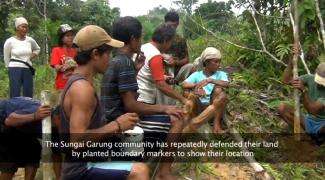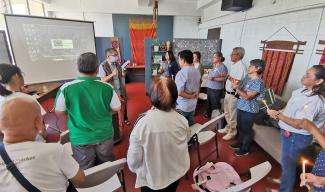A Tale of Garong River and Indigenous Peoples' Independence
Posting Date
By: LBBT, West Kalimantan
Not long ago, the Dayak Melahui Indigenous People in Sungai Garong Village, West Kalimantan, were considered fortunate. They had everything. Lush forest, clear water, and abundant wildlife and natural resources. In the mornings, the tribespeople leave for their farms, for their rubber plantations, or hunt, gather, and carry on other activities. They leave in good spirits and return home with the day's catch or yield. At first they never thought that all this blessing would vanish and end, or change into something new that they do not wish for. They did not receive signs in their dreams foretelling the many problems that came because of their wealth of resources.
Their hope, peace, and brotherhood were ripped apart and lost. A group of men who called themselves builders came, offering Garden of Eden and paradise. In reality, it was all deception, sweet talk, and lies. One West Kalimantan activist likened the men to the snake coiled around the tree of forbidden fruit. Not only the Sungai Garong indigenous people, but even Adam and Eve would have been tempted. Some attempted to taste the forbidden fruit. They did not enjoy the taste, but they could not undo their actions. Their neighbors knew of what they had tried to do. Others emulated the snakes' behavior. The community members who have metamorphed into new snakes are venomous and often bite their own people.
Conflict is inevitable. Now there are more snakes. How do we tell from their outward appearance? How do we decide who's good and bad? Do we only punish the bad, or even those who joined the builders, although only momentarily?
Indigenous people empowerment in Sungai Garong Village in sustainable natural resources protection and management is necessary to face the oncoming threats. This is done through participatory village planning involving men and women, children and youths. Together they discuss and plan ways to manage their natural resources. From these discussions, they decide to build a traditional longhouse or “bentang†as a place to learn together, build a Joint Venture (Usaha Bersama, with the main objective of providing and selling goods for daily needs) as well as form rubber plantation group, vegetable planting group involving indigenous women, develop Borneo ironwood nursery and independently construct main road in Sungai Garong Village for community transportation infrastructure.
In three months, part of the plan has been implemented. Three rubber plantation groups have been formed with a total of 32 members. The groups developed a rubber nursery as the Sungai Garong indigenous people's commitment in preserving their customary land, and the rubber seedlings can serve as evidence for indigenous land ownership. Two vegetable planting groups have been formed with 13 women members. They have appointed coordinating committee and group names, and planted vegetables in the land they tilled. The joint venture group calls themselves Bukit Bersama Joint Venture (Usaha Bersama Bukit Tunggal - UBBT) with 26 members. Each group members deposits IDR 200,000/person. This business of selling groceries has helped the Sungai Garong people in obtaining their needs of basic goods.
Not long ago, the Dayak Melahui Indigenous People in Sungai Garong Village, West Kalimantan, were considered fortunate. They had everything. Lush forest, clear water, and abundant wildlife and natural resources. In the mornings, the tribespeople leave for their farms, for their rubber plantations, or hunt, gather, and carry on other activities. They leave in good spirits and return home with the day's catch or yield. At first they never thought that all this blessing would vanish and end, or change into something new that they do not wish for. They did not receive signs in their dreams foretelling the many problems that came because of their wealth of resources.
Their hope, peace, and brotherhood were ripped apart and lost. A group of men who called themselves builders came, offering Garden of Eden and paradise. In reality, it was all deception, sweet talk, and lies. One West Kalimantan activist likened the men to the snake coiled around the tree of forbidden fruit. Not only the Sungai Garong indigenous people, but even Adam and Eve would have been tempted. Some attempted to taste the forbidden fruit. They did not enjoy the taste, but they could not undo their actions. Their neighbors knew of what they had tried to do. Others emulated the snakes' behavior. The community members who have metamorphed into new snakes are venomous and often bite their own people.
Conflict is inevitable. Now there are more snakes. How do we tell from their outward appearance? How do we decide who's good and bad? Do we only punish the bad, or even those who joined the builders, although only momentarily?
Indigenous people empowerment in Sungai Garong Village in sustainable natural resources protection and management is necessary to face the oncoming threats. This is done through participatory village planning involving men and women, children and youths. Together they discuss and plan ways to manage their natural resources. From these discussions, they decide to build a traditional longhouse or “bentang†as a place to learn together, build a Joint Venture (Usaha Bersama, with the main objective of providing and selling goods for daily needs) as well as form rubber plantation group, vegetable planting group involving indigenous women, develop Borneo ironwood nursery and independently construct main road in Sungai Garong Village for community transportation infrastructure.
In three months, part of the plan has been implemented. Three rubber plantation groups have been formed with a total of 32 members. The groups developed a rubber nursery as the Sungai Garong indigenous people's commitment in preserving their customary land, and the rubber seedlings can serve as evidence for indigenous land ownership. Two vegetable planting groups have been formed with 13 women members. They have appointed coordinating committee and group names, and planted vegetables in the land they tilled. The joint venture group calls themselves Bukit Bersama Joint Venture (Usaha Bersama Bukit Tunggal - UBBT) with 26 members. Each group members deposits IDR 200,000/person. This business of selling groceries has helped the Sungai Garong people in obtaining their needs of basic goods.




